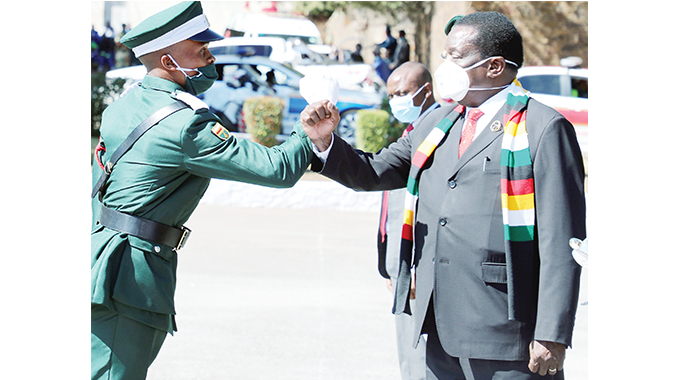Forward ever with our revolution

Stephen Mpofu
PROBABLY no better events would provide a challenge for Zimbabweans to make our country a better place to live for all than did the just-ended celebrations marking Heroes Day and Zimbabwe Defence Forces Day with President Mnangagwa exhorting our nation to consolidate and accelerate — or vice versa — the revolution that recaptured the motherland from abduction by an oppressive racist ruling culture of “those without knees” — a reference by Africans to white invaders who first arrived on the continent in long trousers concealing their knees.
On its part, the Government would take steps to honour heroes and heroines of the armed revolution, with the statue of MbuyaNehanda — who made the first call on the oppressed black people of this country to take up arms and liberate themselves before she was hanged by racist whites rulers in 1898 — as one of the measures to be taken to honour heroes of the armed revolution, in addition to legislative measures to improve the conditions of service for our armed forces who boast a nucleus of former freedom fighters who brought independence to this country in 1980.
The role played by our defence forces since independence in protecting Zimbabwe’s security and sovereignty is clear to everyone, witness the peace and security the country enjoys in spite of the various efforts by the enemy without and within to cause political mayhem.
Add to the commendable role played by the defence forces, their varied contributions to national development and you (yes, you) lay your head restfully on a pillow overnight in the knowledge that you are in safe hands as a nation.
(Of course, the various roles played by our security forces in the maintenance of peace and tranquillity, but often taken for granted by some among the public, also deserves lavish praise to encourage them to do even better.
Indeed, our people in various sectors of the economy go about their business of creating wealth for our nation and sleep blissfully at night without any perturbation but knowing fully well that Big Brother, the law, is watching over them.
Then there is the other, indefatigable breed of workers touted by others as “the eyes and ears” of the State or Government in power, but who regard themselves above all else as “the voices” of povo out there in the shadow of power.
Print and electronic mass communications workers, or journalists as these workers are commonly known have a very, very significant role to play in any society as is demonstrated each day by their contributions to the lives of both governments and the governed in any country.
It goes without saying that the journalism profession requires men and women of unmitigated patriotism and who are neutral rather than biased in the execution of their duty.
On the other hand, scribes who tragically boast inverted patriotism but execute their swagger in public as true professionals are the types of people who run with the hares and hunt with the hounds, like some opposition politicians who are grown among crops in a country by divisive, external enemy forces and fertilised to choke or cause the crops — security, peace and stability to wither away altogether, reducing a nation or nations to beggars of foreign protection.
It is therefore, the duty of patriotic and dedicated journalists to expose sell-outs as enemies of peace, security and stability in a country.
Equally important for any progressive nation, patriotic journalism should help in the fight against corruption through exposure of the anti-social maggots wriggling in the safety of obscurity.
Also of great significance, tribalists or regionalists must be exposed by the pen or other due processes, for instance legal, because the purpose of the revolution was not to liberate a particular tribe or region either but our entire, oppressed black race.
This communicologist believes strongly that media houses and book publishers should respectively produce and saturate rural communities, for instance, with indigenous language newspapers and books, respectively, so that people can read, understand and internalise the tenets of the revolution to run with it and pass the baton onto future generations.
It is indeed tragic that many Zimbabweans believe that our country’s very, very high literacy rating in Africa means that everyone understands the English language, which happens to be official in our country, 40 years after de-colonisation.
A countrywide survey is likely to show that many, many among Zimbabwe’s majority who live out there in the countryside, pejoratively regarded by our former colonial rulers as “the periphery” and so not prioritised in terms of education because the oppressors apparently believed that the more illiterate the masses were, the more submissive they would be to the oppressors, might not understand the English language.
It is equally important, in the absence of a lingua franca for our black people, for simplified but complete accounts on the liberation struggle to be produced and circulated widely so that those not yet born, or were toddlers in 1988 can be made well conversant with the armed struggle which ended colonialism and oppression to herald the peace and stability that Zimbabweans enjoy today.
As a matter of fact, accounts by survivors of the armed struggle, as broadcast on the ZBC to celebrate Defence Forces day about how, for instance, Zanla combatants pulled the military power-rug from the illegal regimes feet with their strike on the fuel tanks in the then Salisbury, a blow that caused the oppressors to trot unashamedly to the Lancaster House talks which led to this country’s independence, will make the last and conclusive chapter of any book written on the armed revolution for Zimbabweans today and in posterity.








Comments